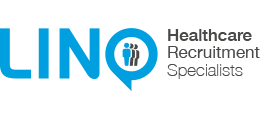
08 Feb Body Language
Body language is a critical aspect of communication, and it plays a significant role in interviews.
During an interview, body language can communicate much more than the words being spoken, and it can have a significant impact on the impression you make on the interviewer.
At Linq Healthcare, we know that interviews can be a daunting experience, but with the right preparation and mindset, you can set yourself up for success.
A key part of our offering to all candidates who register with us, is full, personalised interview preparation, to ensure you are feeling confident meeting your potential new employer.
We will ensure you feel comfortable attending your interview and give you all the tools possible to make it a success. Please reach out to a member of the team for more information on how we can support you, on 0161 924 1433.
Meanwhile, here are some tips for using body language effectively in interviews:
Firstly, remember that your interview begins as soon as you enter the building, so making a good first impression is key.
Treat everyone you meet with respect and display confidence – this can be done by things such as looking people in the eye, smiling and shaking their hand confidently. We’ll look into some of these more below.
Maintain good posture:
Good posture conveys confidence and helps you project an air of professionalism. Stand or sit up straight, with your shoulders back and your head held high.
Make eye contact:
Eye contact is a crucial aspect of body language, and it demonstrates your interest and engagement in the conversation.
Make sure to look directly at the interviewer when they’re speaking, and don’t be afraid to hold eye contact for a few seconds when answering questions.
Use gestures appropriately:
Gestures are a natural part of human communication, but it’s important to use them appropriately in interviews.
Use gestures to emphasise your points and to help you convey your message more effectively. However, avoid excessive gesturing, as this can be distracting.
Smile:
Smiling conveys friendliness and approachability, and it can help put both you and the interviewer at ease.
Smile when you enter the room and when you’re answering questions – but avoid overdoing it, as a forced smile can come across as insincere.
Avoid nervous habits:
Nervous habits such as fidgeting, tapping your feet, or playing with your hair can be distracting and can convey a sense of nervousness or lack of confidence.
Easier said than done we know but make an effort to keep still and calm during the interview.
And remember – practice makes perfect! It’s completely OK if these things don’t come naturally to you. Take the time to practice in front of another person and ask them to provide constructive feedback. If this isn’t possible, consider practising in front of a mirror, or recording yourself and watching back.
As the above shows, body language is a critical aspect of communication, and it plays a significant role in interviews. By paying attention to your posture, eye contact, gestures, smile, and avoiding nervous habits, you can communicate effectively and make a positive impression on the interviewer.
Linq is dedicated to supporting your career in Nursing and AHP. If you are ready to take the next step on your career, please take a look at our current vacancies or register with us.

